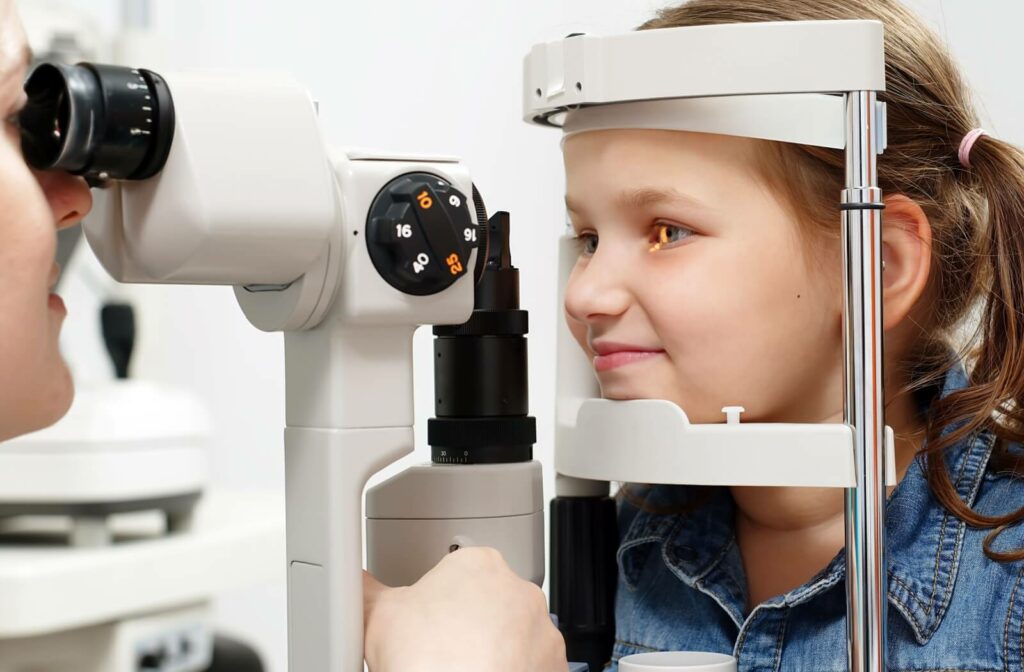Myopia, or nearsightedness, is a common vision condition that affects a significant number of children worldwide. It is characterized by difficulty in seeing distant objects clearly, while close objects remain in focus.
As the prevalence of myopia continues to rise, particularly among school-aged children, it becomes increasingly important for parents and guardians to understand the implications of this condition and the benefits of early intervention. These include addressing impaired academic importance, improving quality of life, reducing the risk of eye health issues, and preventing eye strain.
In this blog, we’ll explore why addressing myopia in children is crucial, the potential consequences of untreated myopia, and the strategies available for managing this condition.
Understanding Myopia in Children
Myopia occurs when the eyeball grows too long from front to back, or when the cornea (the clear front cover of the eye) is too curved. This causes light entering the eye to focus in front of the retina instead of directly on it, resulting in blurry distance vision. Myopia typically begins in childhood and can progress as the child grows.
The incidence of myopia has been increasing at an alarming rate. Factors contributing to this rise include genetic predisposition, increased screen time, and reduced time spent outdoors. Studies have shown that children who spend more time engaging in near activities, such as reading or using electronic devices, are at a higher risk of developing myopia.
Consequences of Untreated Myopia
If left unaddressed, myopia can have adverse effects on a child’s life and overall eye health.
- Impaired Academic Performance: Clear vision is essential for learning. Children with uncorrected myopia may struggle to see the board, read textbooks, or follow along in class, leading to academic difficulties and decreased performance.
- Reduced Quality of Life: Myopia can impact a child’s ability to participate in sports and other recreational activities. It may also affect their social interactions and self-esteem, as they may feel different or less capable than their peers.
- Risk of Eye Health Issues: Progressive myopia increases the risk of developing serious eye conditions later in life, such as retinal detachment, glaucoma, and cataracts. These conditions can lead to vision loss if not properly managed.
- Increased Eye Strain: Children with uncorrected myopia often experience eye strain, headaches, and fatigue, particularly when engaging in activities that require clear distance vision.
The Importance of Early Detection & Intervention

Early detection and intervention are key to managing myopia effectively. Here are some reasons why addressing myopia in children is important:
1. Slowing Myopia Progression
Early intervention can help slow the progression of myopia. Various treatments, such as specialized contact lenses, glasses, and atropine eye drops, have been shown to reduce the rate at which myopia worsens.
2. Enhancing Academic Success
By ensuring that children have clear vision, we can support their academic success. Correcting myopia allows children to see clearly in the classroom, read comfortably, and fully engage in their education.
3. Improving Quality of Life
Addressing myopia enables children to participate fully in sports and recreational activities. It boosts their confidence and social interactions, contributing to a happier and more fulfilling childhood.
4. Protecting Long-Term Eye Health
By managing myopia early, we can reduce the risk of developing serious eye conditions in the future. Preventing high myopia can help preserve vision and eye health over a lifetime.
Strategies for Managing Myopia in Children
Regular Eye Exams
Routine eye exams are essential for early detection and monitoring of myopia. Children should have their first comprehensive eye exam at six months of age, again at three years, before starting school, and annually thereafter.
Prescription Glasses
Glasses are the most common method of correcting myopia. They provide clear distance vision and can be tailored to the child’s needs. Regular check-ups ensure the prescription remains accurate as your child’s eyes grow.
Specialized Contact Lenses
Orthokeratology (Ortho-K) lenses are specially designed contact lenses worn overnight. They gently reshape the cornea, providing clear vision during the day without the need for glasses or contact lenses. Ortho-K lenses have also been shown to slow the progression of myopia.
Atropine Eye Drops
Low-dose atropine eye drops can be prescribed to slow the progression of myopia. These drops are used nightly and are effective in reducing the rate of myopia progression in children.
Increased Outdoor Time
Encouraging children to spend more time outdoors has been shown to reduce the risk of developing myopia and slow its progression. Outdoor activities expose children to natural light and promote healthy visual development.
Limiting Screen Time
Reducing screen time and ensuring regular breaks during near work can help prevent eye strain and potentially reduce the risk of myopia progression. Encouraging a balanced lifestyle with a variety of activities supports overall eye health.
Protect Their Eyes with Myopia Control
By detecting and managing myopia early, we can slow its progression, provide clear vision, and reduce the risk of serious eye conditions in the future.
Dr. Zargar Eyecare is dedicated to providing comprehensive and personalized eye care for children. Our experienced team is here to support your child’s vision health and offer effective solutions for managing myopia.
Schedule an eye exam today and take the first step towards ensuring your child’s clear and healthy vision.

